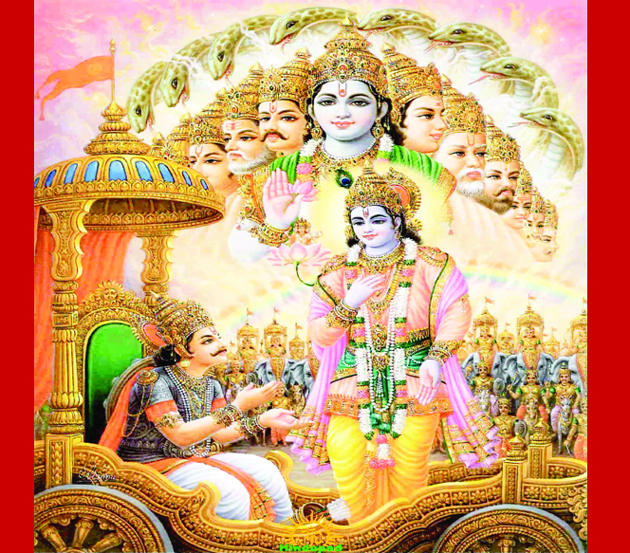Dr Ankush Mahajan
The Bhagavad Gita, a 700-verse Hindu scripture that is part of the Indian epic Mahabharata, has been a source of spiritual and philosophical guidance for millennia. Its teachings, delivered by Lord Krishna to the warrior prince Arjuna on the battlefield of Kurukshetra, transcend time and geography, offering profound insights that remain relevant in today’s fast-paced, often chaotic world.
Famous personalities such as Mahatma Gandhi, Albert Einstein, Carl Jung, and Henry David Thoreau have drawn inspiration from the Bhagavad Gita. Gandhi referred to it as his “spiritual dictionary,” and Einstein admired its profound philosophy. Thoreau’s writings were heavily influenced by the Gita’s wisdom, and Jung found its teachings on self-realization deeply resonant. In this article, we explore how the timeless wisdom of the Bhagavad Gita can provide valuable lessons for modern readers and society, addressing contemporary challenges from various perspectives.
Mental Health and Emotional Well-being
In a world increasingly plagued by mental health issues, the Bhagavad Gita’s teachings on emotional resilience and inner peace are particularly pertinent. Arjuna, facing the moral dilemma of fighting in a war against his own kin, experiences profound despair. Lord Krishna advises him on the importance of maintaining equanimity, regardless of external circumstances.
The verse (Bhagavad Gita 2.38) which asserts “Having an equal view of pleasure and pain, gain and loss, victory and defeat, engage in battle for the sake of battle; thus you will not incur sin.” This counsel highlights the importance of mental equilibrium and detachment, encouraging individuals to remain steadfast in the face of adversity.
As we apply these principles to our personal lives, we can also draw valuable insights for ethical leadership and corporate responsibility.
Ethical Leadership and Corporate Responsibility
Modern corporate environments often struggle with ethical dilemmas and the pressures of profit maximization. The Bhagavad Gita emphasizes the concept of “Dharma” (duty/righteousness) and “Karma” (action), advocating for ethical behavior and integrity. Krishna’s advice to Arjuna, (Bhagavad Gita 2.48), which means “Be steadfast in the performance of your duty, O Arjuna, abandoning attachment to success and failure. Such equanimity is called Yoga,” encourages leaders to act with a sense of duty and fairness, without being swayed by personal gains.
In addition to guiding our personal and professional lives, the Bhagavad Gita’s teachings also offer valuable lessons for sustainable living and environmental ethics.
Sustainable Living and Environmental Ethics
The Gita’s teachings on interconnectedness and the cyclical nature of life can inspire modern society to adopt more sustainable practices. The verse (Bhagavad Gita 3.9) states, “Work done as a sacrifice for the Supreme has to be performed, otherwise work binds one to this material world.” This highlights the need to perform actions selflessly, with a higher purpose in mind.
As we recognize the importance of living in harmony with nature, we can also apply the Bhagavad Gita’s teachings to personal development, cultivating self-awareness and inner peace.
Personal Development and Self-realization
The Bhagavad Gita places great emphasis on self-realization and personal growth. Krishna’s teachings on the nature of the self, the importance of self-discipline, and the pursuit of knowledge can be immensely beneficial for individual development. The verse (Bhagavad Gita 6.5) asserts “One must elevate, not degrade, oneself by one’s own mind. The mind is the friend of the conditioned soul, and his enemy as well.”
By cultivating a deeper understanding of ourselves and our place in the world, we can also apply the Bhagavad Gita’s teachings to conflict resolution and social harmony.
Conflict Resolution and Social Harmony
In today’s polarized world, the Gita’s teachings on compassion, understanding, and the importance of seeing the divine in all beings can promote social harmony and conflict resolution. Krishna’s advice to Arjuna to rise above dualities and see beyond superficial differences is encapsulated in the verse (Bhagavad Gita 5.18), which expresses “The humble sage, by virtue of true knowledge, sees with equal vision a learned and gentle brahmana, a cow, an elephant, a dog, and a dog-eater (outcaste).”
Finally, the Bhagavad Gita’s teachings on detachment and finding balance between duty and personal life are incredibly relevant in the modern context.
Work-Life Balance and the Art of Detachment
The Gita’s teachings on detachment and finding balance between duty and personal life are incredibly relevant in the modern context. Krishna advises Arjuna on the importance of performing one’s duties without attachment to the results, which is encapsulated in the verse (Bhagavad Gita 2.47), which says “You have a right to perform your prescribed duties, but you are not entitled to the fruits of your actions. Never consider yourself the cause of the results of your activities, nor be attached to inaction.”
This principle can guide individuals to maintain a healthy work-life balance, perform their duties efficiently, and avoid burnout by not overly fixating on outcomes. It emphasizes the value of doing one’s best while remaining detached from the results, leading to a more fulfilling and balanced life.
Conclusion
The Bhagavad Gita, with its profound and timeless wisdom, offers invaluable guidance for navigating the complexities of modern life. Its teachings on mental health, ethical leadership, sustainable living, personal development, social harmony, and work-life balance are as relevant today as they were thousands of years ago. By integrating these principles into our daily lives, we can create a more balanced, ethical, and harmonious society.
To ensure a mentally fit and healthy future generation, it is imperative that the teachings of the Bhagavad Gita be imparted to children and young people. By understanding and applying these principles, they can build resilience against anxiety, stress, and depression, contributing to a society that is both strong and compassionate. In a world that often seems divided and tumultuous, the Gita’s message of inner peace, duty, and universal compassion serves as a beacon of hope and guidance. As we continue to face new challenges and uncertainties, the timeless wisdom of the Bhagavad Gita can inspire us to live with greater purpose, integrity and resilience.
Trending Now
E-Paper


